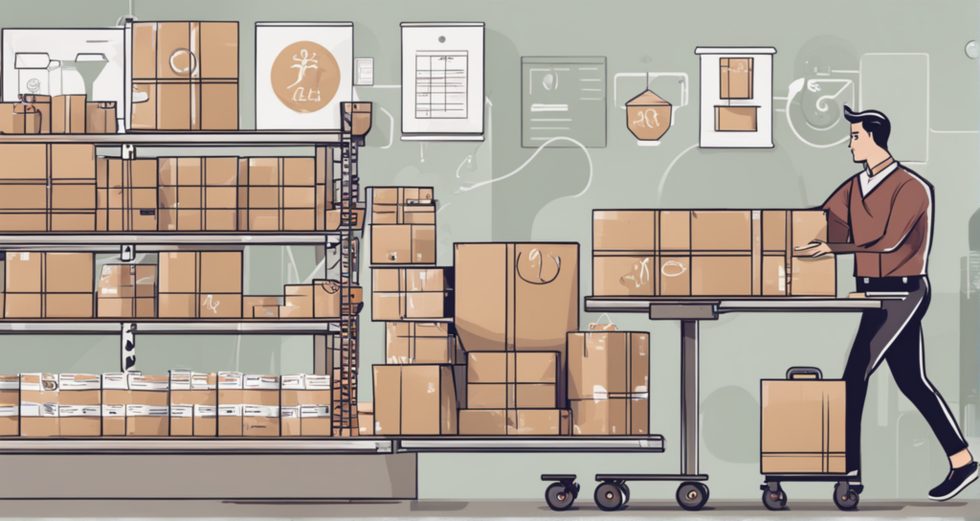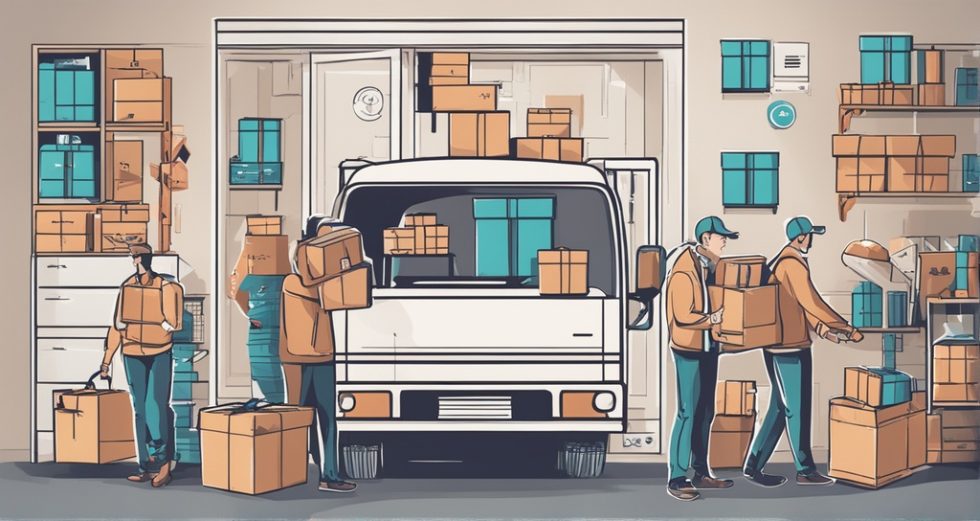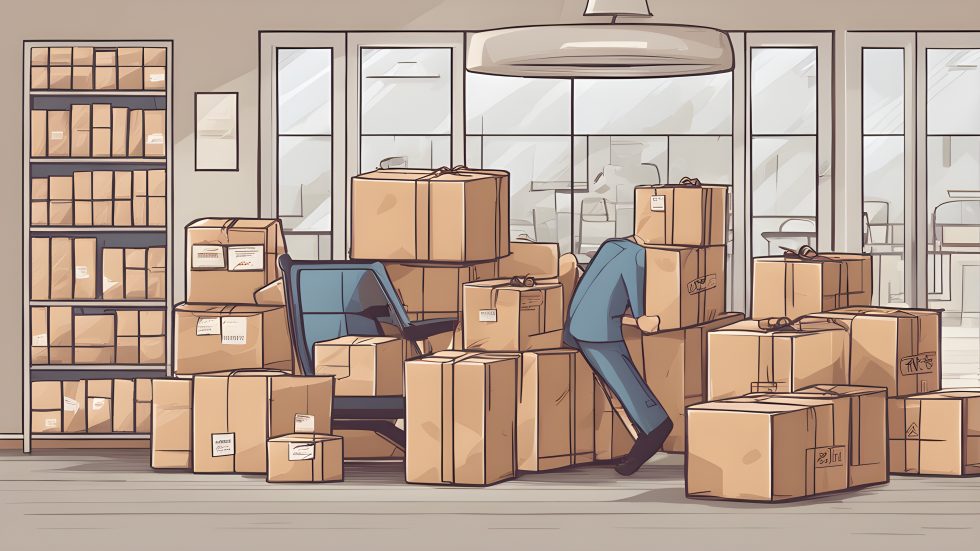Today’s article refers to the two articles already published and linked again in the footer about the unsuccessful purchase of an item declared to be in stock and the subsequent hurdles for the customer, which should actually not be any, because here the process is very clearly regulated by law. But since most customers do not know the business model behind such stores as Galaxus, Media Markt or Cyberport, Mindfactory & Co. (the list would be endless), I sat down again, and summarized the most important lessons and information for you after legal advice. It is important to know that this is not a legal advice, because I can not nor may not provide it. It is merely an enumeration of regulations and facts, on the basis of which everyone can make up his own mind. It is irrelevant for the customer how high the share of self-traded goods and the share from the so-called dropshipping is at the respective retailer.
What is dropshipping?
Dropshipping, also known as direct shipping, drop shipment or fulfillment, is a growing business model in online retailing. Here, the goods are not sent by the online seller itself, but directly from the supplier or manufacturer on behalf of the online seller to the end customer. When a customer orders from such a webshop, the webshop operator passes the order on to its supplier. The latter stores, packages and sends the goods directly to the customer without the online retailer ever having any physical contact with the goods. The retailer has either built up his business completely on dropshipping or he only uses it to open up new business areas in addition to the existing ones without any risk, or to be able to offer products from manufacturers in direct sales.
Nothing changes for the buyer: he buys as usual in the online store, concludes the contract with the online retailer and receives the goods. The fact that the delivery comes from another company and not from the web store itself is usually not apparent to the buyer. Basically, dropshipping is a logistics service provided by the responsible supplier. However, the separation of sales and shipping between the online retailer and supplier can present legal challenges, as in my case. But the most important thing for the customer is:
In dropshipping, the retailer directly enters into sales contracts with end customers while also entering into contractual ties with the supplier. The dropshipping merchant is fully liable to the buyer and can only claim internally against the supplier if the latter makes mistakes.
Obligations of online retailers and downstream suppliers or manufacturers
Web store operators benefit from reduced capital commitment with dropshipping because they do not have to buy the goods in advance. Only when a customer orders in the webshop, the goods are purchased from the supplier. This saves on storage costs and the expense of shipping. In addition, online retailers can expand their product range more easily because the risk of unsold items is minimized. However, online retailers also lose a not inconsiderable amount of control over their business as a result, particularly with regard to the quality and dispatch of the goods. Profit margins can shrink as suppliers must be paid for their services. Returns can be complicated unless there is a specific agreement with the supplier (more on that in a moment). Still, retailers need to have their own, albeit smaller, shipping department. Okay, at least they should.
This all requires a dual contractual system. Thus, a critical point for the retailer is the contract with the dropshipping partner. This should take into account both storage and delivery modalities and cover typical risks. A problem can also be that the dropshipping partner is located abroad, perhaps even outside the EU. This raises questions regarding the legal system and the enforcement of claims in the event of a dispute. Although the merchant has recourse against the dropshipping partner, enforcing them can be complicated, especially for contracts with companies outside the EU. But that is the online merchant’s sole problem.
Online retailers operating in the dropshipping model and shipping products directly to customers via suppliers may be subject to extensive additional legal obligations arising from harmonized Community law, depending on the model design. Particularly relevant here are the requirements of packaging law, product safety law, and specific legislation for certain product categories such as, in our case, electrical appliances and electronics. The extent to which dropshipping retailers are directly affected by these specific regulations depends, of course, largely on whether the deliveries originate from countries outside the EU or are made by suppliers within the European Economic Area. But a more detailed listing and explanation would lead too far at this point. The customer only needs to know that the retailer is almost always responsible for this.
Dropshipping is also relevant in terms of data protection law, since the customer data collected by the retailer is forwarded to the supplier for contract processing. After all, the supplier is responsible for delivering the order. According to the General Data Protection Regulation (GDPR), the transfer of customer data by the dropshipping merchant to the supplier is usually legitimized by Art. 6 (1) lit. b GDPR. This article allows data processing operations, including their transfer, if they are exclusively necessary for the performance of the contract.
In order to carry out dropshipping in accordance with data protection, it must also be ensured that only the data that is absolutely necessary for delivery is transferred to the supplier. As a rule, this is only the first name, last name and delivery address. For the transmission of further data, such as e-mail address or telephone number, a separate data protection justification is usually required and, in case of doubt, the prior consent of the customer is necessary, but distributors are not obliged to conclude order processing agreements (AVV) with them. However, it is essential that the dropshipping merchant transparently informs about the transfer of customer data to the supplier in its privacy policy in accordance with Art. 13 DSGVO. So sometimes it already helps to take a look at the merchant’s privacy policy to determine whether the merchant uses dropshipping or exclusively trades itself.
Another aspect is packaging legal hurdles and regulations. If an online retailer has its products shipped by an external service provider, this service provider is usually responsible for the shipping packaging and must register and participate in the system accordingly. This can either be a fulfillment service provider, a producer or a wholesaler who is directly commissioned with the shipping in dropshipping. According to the Packaging Act, the person who puts the goods into circulation for the first time is obliged to comply. The only exception is if only the online retailer is visible on the outer packaging. In this case, the online retailer itself must register and participate in the system. The contracted logistics service provider may not appear as the sender on the packaging in this case.
European product safety law, which in Germany is primarily anchored in the Product Safety Act (ProdSG), primarily obliges those who place products on the market to ensure that they comply with safety law. In addition to requirements for product design in accordance with technical safety standards, distributors must also ensure that products are used in a way that minimizes risk. A comprehensive program of obligations is therefore imposed on them. So much for the concerns of distributors.
What counts for the customer alone
The dealer is the sole point of contact for the customer, as the dealer is liable to the customer for the correct execution of the purchase contract and the agreed product quality in accordance with Section 433 (1) of the German Civil Code (BGB). If the customer receives defective goods from the dropshipping partner or the delivery is not as promised by the retailer, the customer can direct his claims to the retailer. This is because the supplier acts as an agent of the dropshipping merchant in the execution of the contract. Thus, the merchant is liable for errors made by the supplier to the customer on the basis of Section 278 of the German Civil Code (BGB), as if they were the merchant’s own.
An additional problem concerns the statutory right of withdrawal for distance contracts. This right of withdrawal takes effect according to §§ 312g and 355 BGB already after the expression of will in the form of the order! However, the regulation about the maximum period for a revocation begins only with the receipt of the goods by the customer, you have to know that and as a customer also insist on it. Here the dealer gets however problems, if he ordered for his part already with the supplier. However, this is his sole internal problem (and business risk), which may not be rolled over to the customer! Only if the shipment by the third-party supplier can be proven to have already taken place, the revocation including the deadline takes effect with the receipt of the goods, which must then be returned.
In principle, the retailer must accept the goods returned by the customer under the right of withdrawal. However, this can lead to logistical challenges if the retailer does not have sufficient storage facilities or its own logistics. For this reason, there are often agreements between retailers and dropshipping partners in which the dropshipping partner takes over the returns management. In such a case, the retailer must decide where the customer should return the goods in the event of a cancellation and must also make this clear in its cancellation policy. If the goods are to be returned to an address other than that of the retailer, this address must be stated in full in the cancellation policy. There are legal concerns with this, especially if the customer has to return the goods to another country at his own expense. It is questionable whether this is reasonable for the consumer, especially if he has to return the goods to a country that is not his country of residence.
In summary, the customer simply has to know and be aware that his position vis-à-vis the stores with extensive dropshipping is better than he might think at first glance. As long as this business model is implemented well, there is no need to reproach the retailers either, because it also brings more variety for the customer. Everything from a single source can also be cheaper (but it doesn’t have to be). As a customer, you only have to be very careful when it comes to promised delivery dates, because this is where the internal chain between the retailer and the external suppliers still has the biggest weaknesses.




































96 Antworten
Kommentar
Lade neue Kommentare
Urgestein
1
Urgestein
1
Urgestein
Urgestein
Urgestein
Veteran
Urgestein
Veteran
Urgestein
Urgestein
Urgestein
Urgestein
Urgestein
Veteran
Urgestein
1
Urgestein
Alle Kommentare lesen unter igor´sLAB Community →